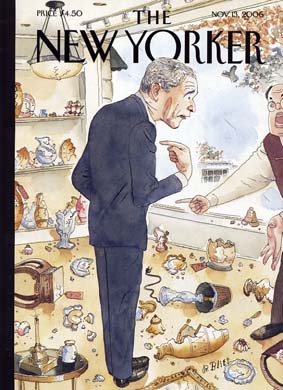
|

|

THE GEORGE W. BUSH RECORD
ACCORDING TO HISTORIANS
> He has taken the country into an unwinnable war and alienated friend and foe alike in the process;
> He is bankrupting the country with a combination of aggressive military spending and reduced taxation of the
He has deliberately and dangerously attacked separation of church and state;
> He has repeatedly "misled," to use a kind word, the American people on affairs domestic and foreign;
> He has proved to be incompetent in affairs domestic (New Orleans) and foreign (Iraq and the battle against al-Qaida);
> He has sacrificed American employment (including the toleration of pension and benefit elimination) to increase overall
productivity;
> He is ignorantly hostile to science and technological progress;
> He has tolerated or ignored one of the republic's oldest problems, corporate cheating in supplying the military in
wartime.

ONE MINUTE IN IRAQ = $380,000
By Nicholas D. Kristof
International Herald Tribune 10/25/06
For every additional second America stays in Iraq, U.S. taxpayers will end up paying an additional $6,300. So aside from
the rising body counts and all the other good reasons to adoopt a timetable for withdrawal from Iraq, here's another: America
is spending vast sums there that would be better spent rescuing the American health care system, developing alternative forms
of energy and making a serious effort to reduce global poverty. The bottom line is that not only have we squandered 2,790
American lives and considerable American prestige in Iraq, but we're also paying $18,000 per household to do so.

THE DEMOCRATIC HOUSE
Op/Ed page of The New York Times
November 8, 2006
There was only one explanation for the crazy-quilt combination of victories around the country that gave the Democrats
control of the House of Representatives last night: an angry shout of repudiation of the Bush White House and the abysmal
way the Republican majority has run Congress.
It was a satisfying expression of the basic democratic principle of accountability. A government that performs badly is
supposed to be punished by the electorate. And this government has performed badly on so many counts.

HOW NANCY PELOSI, SPEAKER OF THE
HOUSE DESCRIBES GEORGE W. BUSH.
"Incompetent, a liar and dangerous."

THE NEW YORKER
November 13, 2006
politics 4
|

|

|

|

|

|

PIRATES OF THE MEDITERANEAN
By Robert Harris
Op-Ed page of The New York Times
IN the autumn of 68 B.C. the world's only military superpower was dealt a profound psychological blow by a daring terrorist
attack on its very heart. Rome's port at Ostia was set on fire, the consular war fleet destroyed, and two prominent senators,
together with their bodyguards and staff, kidnapped.
The incident, dramatic though it was, has not attracted much attention from modern historians. But history is mutable.
An event that was merely a footnote five years ago has now, in our post-9/11 world, assumed a fresh and ominous significance.
For in the panicky aftermath of the attack, the Roman people made decisions that set them on the path to the destruction of
their Constitution, their democracy and their liberty. One cannot help wondering if history is repeating itself.
Consider the parallels. The perpetrators of this spectacular assault were not in the pay of any foreign power: no nation
would have dared to attack Rome so provocatively. They were, rather, the disaffected of the earth: The ruined men of all nations,
in the words of the great 19th-century German historian Theodor Mommsen, a piratical state with a peculiar esprit de corps.
Like Al Qaeda, these pirates were loosely organized, but able to spread a disproportionate amount of fear among citizens
who had believed themselves immune from attack. To quote Mommsen again: The Latin husbandman, the traveler on the Appian highway,
the genteel bathing visitor at the terrestrial paradise of Baiae were no longer secure of their property or their life for
a single moment.
What was to be done? Over the preceding centuries, the Constitution of ancient Rome had developed an intricate series
of checks and balances intended to prevent the concentration of power in the hands of a single individual. The consulship,
elected annually, was jointly held by two men. Military commands were of limited duration and subject to regular renewal.
Ordinary citizens were accustomed to a remarkable degree of liberty: the cry of "Civis Romanus sum", "I am
a Roman citizen" was a guarantee of safety throughout the world.
But such was the panic that ensued after Ostia that the people were willing to compromise these rights. The greatest soldier
in Rome, the 38-year-old Gnaeus Pompeius Magnus (better known to posterity as Pompey the Great) arranged for a lieutenant
of his, the tribune Aulus Gabinius, to rise in the Roman Forum and propose an astonishing new law.
Pompey was to be given not only the supreme naval command but what amounted in fact to an absolute authority and uncontrolled
power over everyone, the Greek historian Plutarch wrote. There were not many places in the Roman world that were not included
within these limits.
Pompey eventually received almost the entire contents of the Roman Treasury 144 million sesterces to pay for his war on
terror, which included building a fleet of 500 ships and raising an army of 120,000 infantry and 5,000 cavalry. Such an accumulation
of power was unprecedented, and there was literally a riot in the Senate when the bill was debated.
Nevertheless, at a tumultuous mass meeting in the center of Rome, Pompe's opponents were cowed into submission, the Lex
Gabinia passed (illegally), and he was given his power. In the end, once he put to sea, it took less than three months to
sweep the pirates from the entire Mediterranean. Even allowing for Pompey's genius as a military strategist, the suspicion
arises that if the pirates could be defeated so swiftly, they could hardly have been such a grievous threat in the first place.
But it was too late to raise such questions. By the oldest trick in the political book the whipping up of a panic, in
which any dissenting voice could be dismissed as soft or even traitorous powers had been ceded by the people that would never
be returned. Pompey stayed in the Middle East for six years, establishing puppet regimes throughout the region, and turning
himself into the richest man in the empire.
Those of us who are not Americans can only look on in wonder at the similar ease with which the ancient rights and liberties
of the individual are being surrendered in the United States in the wake of 9/11. The vote by the Senate on Thursday to suspend
the right of habeas corpus for terrorism detainees, denying them their right to challenge their detention in court; the careful
wording about torture, which forbids only the inducement of serious; physical and mental suffering to obtain information;
the admissibility of evidence obtained in the United States without a search warrant; the licensing of the president to declare
a legal resident of the United States an enemy combatant; all this represents an historic shift in the balance of power between
the citizen and the executive.
An intelligent, skeptical American would no doubt scoff at the thought that what has happened since 9/11 could presage
the destruction of a centuries-old constitution; but then, I suppose, an intelligent, skeptical Roman in 68 B.C. might well
have done the same.
In truth, however, the Lex Gabinia was the beginning of the end of the Roman republic. It set a precedent. Less than a
decade later, Julius Caesar; the only man, according to Plutarch, who spoke out in favor of Pompey's special command during
the Senate debate; was awarded similar, extended military sovereignty in Gaul. Previously, the state, through the Senate,
largely had direction of its armed forces; now the armed forces began to assume direction of the state.
It also brought a flood of money into an electoral system that had been designed for a simpler, non-imperial era. Caesar,
like Pompey, with all the resources of Gaul at his disposal, became immensely wealthy, and used his treasure to fund his own
political faction. Henceforth, the result of elections was determined largely by which candidate had the most money to bribe
the electorate. In 49 B.C., the system collapsed completely, Caesar crossed the Rubicon; and the rest, as they say, is ancient
history.
It may be that the Roman republic was doomed in any case. But the disproportionate reaction to the raid on Ostia unquestionably
hastened the process, weakening the restraints on military adventurism and corrupting the political process. It was to be
more than 1,800 years before anything remotely comparable to Rome's democracy; imperfect though it was; rose again.
The Lex Gabinia was a classic illustration of the law of unintended consequences: it fatally subverted the institution
it was supposed to protect. Let us hope that vote in the United States Senate does not have the same result.
|

|

|

|

|

|

SNAKE EYES
Excerpted from The Talk of the Town.
The New Yorker, August 21, 2006.
By Hendrik Hertzberg.
"The concrete losses are horrific: nearly three thousand American and "coalition" troops killed; thousands
more maimed; scores of thousands of Iraqi civilians dead; a third of a trillion dollars burned through. So are the less tangible
ones: the unprecedented levels of anti-Americanism throughout the Muslim world and Europe; the self-inflicted loss of America's
moral prestige; the neglect of real nuclear dangers, in Iran and North Korea, whil chimeras were chased in Iraq. The neoconservative
project of a friendly, democratic Middle East with Israel and Palestine living side by side in peace, is worse that a charred
ruin -- it is a flaming inferno."

A MOST VIOLENT MONTH, AND MANY FINAL FAREWELLS
The New York Times, October 30, 2006
Burials at Arlington National Cemetery took on a grim regularity in October, when at least 103 American troops were killed
in Iraq and Afghanistan. In Iraq, the toll had reached 99 by Saturday, making October the deadliest month since January 2005.

THE BUSH QUIZ
Excerpt from The New Yorker
August 7/14, 2006 issue
Which of these words were among the top ten responses in the Pew Research Center poll that asked voters for the first
word that came to mind when they think about George W. Bush?
(a) Decisive, charming, brilliant, and truthful.
(b) Booze, cocaine, failure and smirk.
(c) Illegitimate, simian, hotheaded and torture.
(d) Incompetent, idiot, liar and ass.
Answer: d

EXCERPT FROM NY TIMES OP/ED PAGE
6 November 2006
This election is indeed about George W. Bush; and the Congressional majority's insistence on protecting him from the consequences
of his mistakes and misdeeds. Mr. Bush lost the popular vote in 2000 and proceeded to govern as if he had an enormous mandate.
After he actually beat his opponent in 2004, he announced he now had real political capital and intended to spend it. We have
seen the results. It is frightening to contemplate the new excesses he could concoct if he woke up next Wednesday and found
that his party had maintained its hold on the House and Senate.

AL GORE
"The Iraq war is the worst strategic mistake in the entire history of the United States."
|

|

|

